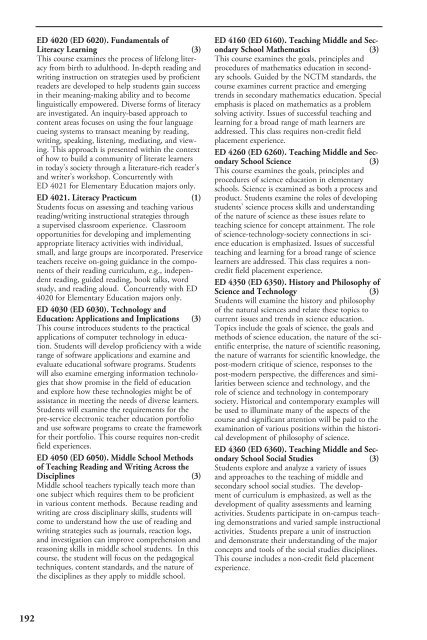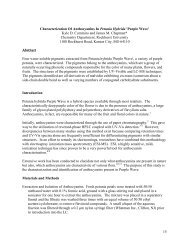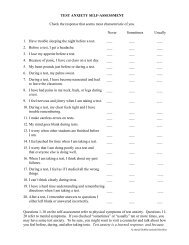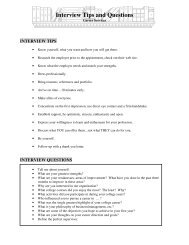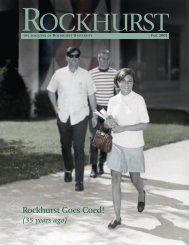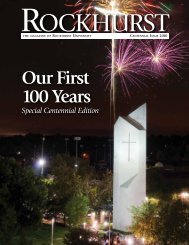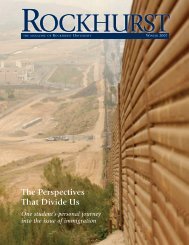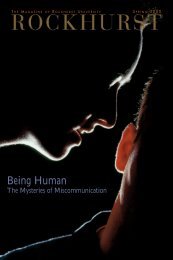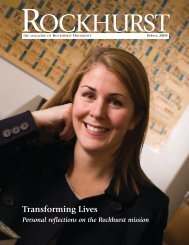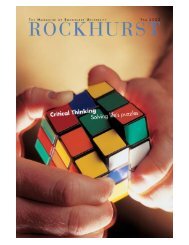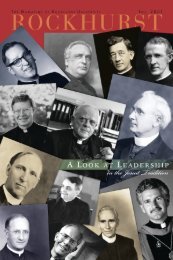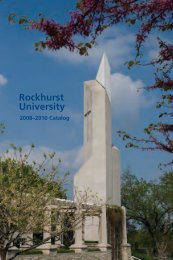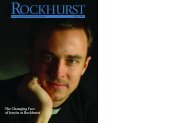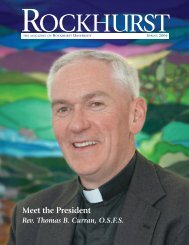RockhuRst univeRsity 2012â2014 catalog
RockhuRst univeRsity 2012â2014 catalog
RockhuRst univeRsity 2012â2014 catalog
- No tags were found...
Create successful ePaper yourself
Turn your PDF publications into a flip-book with our unique Google optimized e-Paper software.
ED 4020 (ED 6020). Fundamentals ofLiteracy Learning (3)This course examines the process of lifelong literacyfrom birth to adulthood. In-depth reading andwriting instruction on strategies used by proficientreaders are developed to help students gain successin their meaning-making ability and to becomelinguistically empowered. Diverse forms of literacyare investigated. An inquiry-based approach tocontent areas focuses on using the four languagecueing systems to transact meaning by reading,writing, speaking, listening, mediating, and viewing.This approach is presented within the contextof how to build a community of literate learnersin today’s society through a literature-rich reader’sand writer’s workshop. Concurrently withED 4021 for Elementary Education majors only.ED 4021. Literacy Practicum (1)Students focus on assessing and teaching variousreading/writing instructional strategies througha supervised classroom experience. Classroomopportunities for developing and implementingappropriate literacy activities with individual,small, and large groups are incorporated. Preserviceteachers receive on-going guidance in the componentsof their reading curriculum, e.g., independentreading, guided reading, book talks, wordstudy, and reading aloud. Concurrently with ED4020 for Elementary Education majors only.ED 4030 (ED 6030). Technology andEducation: Applications and Implications (3)This course introduces students to the practicalapplications of computer technology in education.Students will develop proficiency with a widerange of software applications and examine andevaluate educational software programs. Studentswill also examine emerging information technologiesthat show promise in the field of educationand explore how these technologies might be ofassistance in meeting the needs of diverse learners.Students will examine the requirements for thepre-service electronic teacher education portfolioand use software programs to create the frameworkfor their portfolio. This course requires non-creditfield experiences.ED 4050 (ED 6050). Middle School Methodsof Teaching Reading and Writing Across theDisciplines (3)Middle school teachers typically teach more thanone subject which requires them to be proficientin various content methods. Because reading andwriting are cross disciplinary skills, students willcome to understand how the use of reading andwriting strategies such as journals, reaction logs,and investigation can improve comprehension andreasoning skills in middle school students. In thiscourse, the student will focus on the pedagogicaltechniques, content standards, and the nature ofthe disciplines as they apply to middle school.ED 4160 (ED 6160). Teaching Middle and SecondarySchool Mathematics (3)This course examines the goals, principles andprocedures of mathematics education in secondaryschools. Guided by the NCTM standards, thecourse examines current practice and emergingtrends in secondary mathematics education. Specialemphasis is placed on mathematics as a problemsolving activity. Issues of successful teaching andlearning for a broad range of math learners areaddressed. This class requires non-credit fieldplacement experience.ED 4260 (ED 6260). Teaching Middle and SecondarySchool Science (3)This course examines the goals, principles andprocedures of science education in elementaryschools. Science is examined as both a process andproduct. Students examine the roles of developingstudents’ science process skills and understandingof the nature of science as these issues relate toteaching science for concept attainment. The roleof science-technology-society connections in scienceeducation is emphasized. Issues of successfulteaching and learning for a broad range of sciencelearners are addressed. This class requires a noncreditfield placement experience.ED 4350 (ED 6350). History and Philosophy ofScience and Technology (3)Students will examine the history and philosophyof the natural sciences and relate these topics tocurrent issues and trends in science education.Topics include the goals of science, the goals andmethods of science education, the nature of the scientificenterprise, the nature of scientific reasoning,the nature of warrants for scientific knowledge, thepost-modern critique of science, responses to thepost-modern perspective, the differences and similaritiesbetween science and technology, and therole of science and technology in contemporarysociety. Historical and contemporary examples willbe used to illuminate many of the aspects of thecourse and significant attention will be paid to theexamination of various positions within the historicaldevelopment of philosophy of science.ED 4360 (ED 6360). Teaching Middle and SecondarySchool Social Studies (3)Students explore and analyze a variety of issuesand approaches to the teaching of middle andsecondary school social studies. The developmentof curriculum is emphasized, as well as thedevelopment of quality assessments and learningactivities. Students participate in on-campus teachingdemonstrations and varied sample instructionalactivities. Students prepare a unit of instructionand demonstrate their understanding of the majorconcepts and tools of the social studies disciplines.This course includes a non-credit field placementexperience.192


